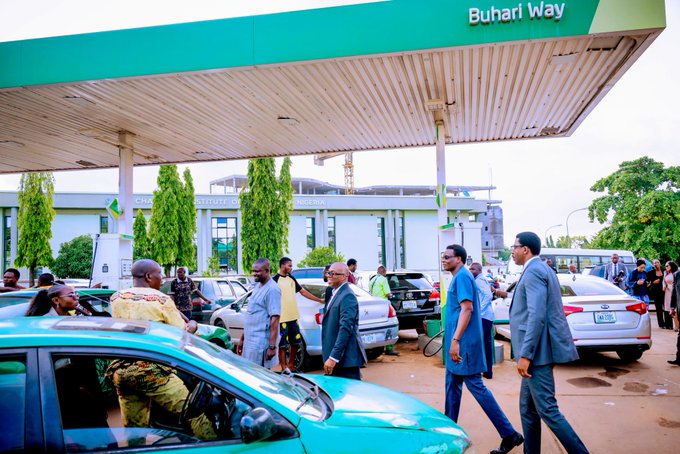Amid mounting public pressure over skyrocketing fuel prices, the Nigerian National Petroleum Company Limited (NNPCL) has adjusted its pump price to N925 per litre in Lagos. The move marks a significant response to the drop in ex-depot prices for premium motor spirit (PMS) and sets the stage for competition among major oil marketers.
New Prices, New Realities
The price adjustment comes as MRS Oil and Gas, in partnership with the Dangote Refinery, announced a uniform national price of N935 per litre at its outlets. Previously, MRS stations sold petrol at N939.50, but the new pricing reflects a reduction in the ex-depot price from N970 to N899.50 per litre. The development is part of a coordinated effort to stabilize the market and address public discontent over fuel costs.
While NNPCL stations have introduced a slightly lower price of N925 per litre in Lagos, other marketers like Bovas and AP are still selling above N985 per litre. Major players like Conoil and Mobil remain outliers, offering fuel at N1,065 and N1,015 per litre respectively.
A Step Towards Market Stability
This pricing shift follows assurances from the Independent Petroleum Marketers’ Association of Nigeria (IPMAN) that fuel prices would stabilize at N935 nationwide. IPMAN attributed this to Dangote Refinery’s strategic pricing arrangement, which aims to align marketers under a uniform pricing regime.
MRS Oil and Gas has further underscored its commitment to the new price by launching a digital monitoring system to ensure compliance across its outlets. Nigerians have been encouraged to report any discrepancies at retail stations, a move analysts say will bolster accountability within the sector.
Mixed Reactions at the Pumps
Across Lagos, the reduction has brought mixed reactions. While some commuters expressed relief at the lower prices, others lamented the persisting high cost of living. At an MRS station in Alapere along the Lagos-Ibadan Expressway, long queues of motorists were observed.
Mrs. Ibukun Phillips, a resident of Lagos, expressed her joy after her husband filled their vehicle at the new price. “This feels like a Christmas miracle,” she said. “We hope other marketers follow suit quickly.”
For commercial drivers like Adio Ajibade, the drop offers a glimmer of hope amid the festive rush. “Fuel prices have crippled our earnings, but this reduction is a step in the right direction,” Ajibade remarked.
Strategic Partnerships and Eco-Friendly Promises
The collaboration between Dangote Refinery and MRS Oil has also highlighted a broader agenda: enhancing product quality while promoting environmental sustainability. In a statement, MRS emphasized the eco-friendly nature of its products and called on other petrol station operators to support the indigenous refinery instead of relying on imported, off-spec products.
The move is seen as a way to encourage reliance on domestic resources, thereby reducing Nigeria’s dependence on foreign imports and strengthening the local economy.
Experts Weigh In
Public affairs analyst and university lecturer Dr. Tunde Akanni hailed the collaboration as a game-changer. According to Akanni, the move not only reduces financial burdens on Nigerians but also introduces a more sustainable approach to fuel consumption.
“This shift is crucial for both economic stability and public health,” Akanni explained. “If properly managed, it can improve affordability while addressing environmental concerns associated with low-quality imports.”
Challenges Remain
Despite these optimistic developments, challenges persist. Many filling stations continue to sell fuel at exorbitant prices, with some marketers citing logistical bottlenecks and supply chain inefficiencies. Industry watchers argue that while the Dangote Refinery-MRS partnership is commendable, more needs to be done to bring all players into alignment.
Furthermore, concerns over fuel affordability linger as Nigerians grapple with the broader effects of subsidy removal and rising inflation. The festive season, traditionally marked by increased travel and economic activity, has only amplified these challenges.

